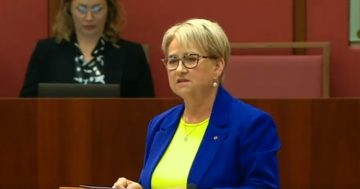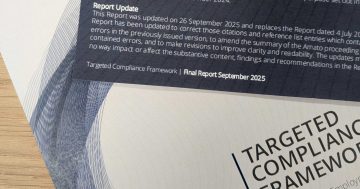
The Department of Finance has a few things to take on board from the Senate inquiry into consultancy contracts. Photo: James Coleman.
Beyond the clear messages the Senate’s Finance and Public Administration References Committee delivered to PricewaterhouseCoopers with its recently delivered final report, there is so much more it says to and about the external consultancy sector.
The inquiry into the “management and assurance of integrity by consulting services” took 14 months and tabled two progress reports before handing down its final report to Parliament last week.
It is scathing of PwC, its breach of trust in leaking confidential Treasury information for its personal gain, and its lack of cooperation in revealing the extent of that breach by hiding those at the heart of it.
As reported, the first of the committee’s 12 recommendations goes straight to PwC’s responsibility.
“The committee recommends that PwC be open and honest with the Australian Parliament and people, and with the international community, by promptly publishing accurate and detailed information about the involvement of PwC partners and personnel (including names and positions) in the breach of confidential government information,” it states.
And there are plenty more damning conclusions the cross-party committee reached about PwC and its betrayal of the Federal Parliament and Australian taxpayers.
The inquiry’s reach went far beyond PwC and its despicable behaviour.
It looked at the entire consulting industry as it relates to government contracts, with a particular emphasis on the so-called Big Four firms.
What it discovered, through the receipt of 61 submissions, 10 public hearings and dozens of witnesses, is that the high-flying consultancy sector has been milking the Australian Public Service like a cash cow for decades – and with no great concern about accountability.
“The motivations of the consulting firms and the APS, at their core, are different and some submitters suggested that this difference in values amounts to an inconsistency in values,” the report states.
“Several submitters noted their concern at what they considered to be a clear contradiction in motivations between the APS and consultants.
“They considered that consultants are primarily concerned with making a profit, whereas the APS works to support the Australian community.
“Consulting firms that are private companies are market players who exist to generate profit …
“Some submitters suggested that one driver in the consulting firms’ priority of profit over values is linked to a lack of consequences for disregarding the values they claim to hold.”
Those are very damning words and they are just a fraction of what the 94-page document (170 pages with additional comments and appendices) dishes up by way of criticism of consultants and the comfort zone consecutive governments have not only allowed, but embraced.
“Australia’s spending on consultancy services is proportionally greater than any other country,” the report states.
“In the past two decades, the Australian Government has relied increasingly on consultants to undertake work for the Australian Public Service, with the bulk of work performed by the Big Four consulting firms (Deloitte, EY, KPMG and PwC).
“Increased use of consultants has limited the capability growth of the APS, given rise to occasions of serious conflict of interest, and been accompanied by questions about transparency.
“It has also resulted in enormous costs to the APS for work that is often opaque and, in some instances, raised genuine questions regarding value for money.”
A read of the entire report leaves no doubt the system is broken and has been exploited by carpet-baggers for far too long.
Beyond its critique of the Big Four (and some of the lesser gods), the senators have also delivered the Department of Finance a wake-up call.
Finance needs to get on top of the whole contracting process, they say, and put an end to a system that all but encourages conflicts of interest.
Make it clearer for procurement officers what is required, but also make sure that contractors provide value for money and demonstrate a duty to act in the public interest when delivering government work.
Finance Minister Katy Gallagher was asked about lessons in the report for her department and she agreed that conflict-of-interest problems have been a concern in government contracts.
“This is one of the areas I think that I’ve been very interested in and have been highlighted by some of the issues that we’ve seen over the last couple of years,” she told ABC Radio.
“So, Finance is already having a look at issues around conflicts of interest and confidentiality more broadly. And so this report will feed into that. I think there is work that we need to do in this space …
“We’re trying to go as fast as we can. In a sense, we were waiting for this report, too, because Finance has appeared before this committee.
“We’re also moving forward with changes at the same time. So, for example, we’re about to release a new supplier code of conduct which goes to some of these issues around managing conflicts and being a good corporate citizen in the way that you conduct your work with the Commonwealth.”
Original Article published by Chris Johnson on Riotact.








